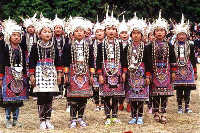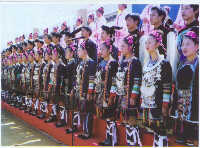 According to the Dong people in southwestern China, "The Han people, having their own autography, pass down books, while the Dong people, without an autography, pass down songs from generation to generation. Rice is food for the body, and song is food for the soul." The Dong people have never had an autography of its own, and did not have a writing system until 1958. Before that the Dong Culture, the history and stories were all recorded and handed down by means of songs. For this reason, the Dong culture, though having experienced ups and downs in history, has been well preserved and is gradually drawing attention from the world.
According to the Dong people in southwestern China, "The Han people, having their own autography, pass down books, while the Dong people, without an autography, pass down songs from generation to generation. Rice is food for the body, and song is food for the soul." The Dong people have never had an autography of its own, and did not have a writing system until 1958. Before that the Dong Culture, the history and stories were all recorded and handed down by means of songs. For this reason, the Dong culture, though having experienced ups and downs in history, has been well preserved and is gradually drawing attention from the world.
One of the ethnic minority groups of China, the Dong people are said to be the descendants of the ancient Guyue people, with a history of 2500 years. Mainly distributed in Guizhou, Hunan,GuangxiandHubei provinces, the Dong group has a population of 2.6 million, the majority of which is engaged in agriculture and forestry. Honest and simple, the Dong people are rich in creativity, as a folk saying goes, "The Dong culture has three treasures:drum tower, grand songs and bridalsedan chair." Among these treasures, the grand songs are a kind of folk music special to the Dong group.
and simple, the Dong people are rich in creativity, as a folk saying goes, "The Dong culture has three treasures:drum tower, grand songs and bridalsedan chair." Among these treasures, the grand songs are a kind of folk music special to the Dong group.
Grand songs, known as "Galao" among the locals, are the most representative public chorus of the Dong people, and popular mainly in Liping, Rongjiang, Congjiang of Guizhou Province, and Sanjiang in Guangxi Province. Grand songs have various types, mainly: the narrative style, mainly about story plots and persona dialogues; the lyric style, mainly about love between the two genders; morality style, mainly about religious and morality expostulations; and vocality style, mainly showing the beauty of musical melody; There are also etiquette-and-custom, drum-tower and local opera grand songs; According to different singers, there are grand songs for male, female and children's voice. They are all performed by well-trained chorus.
